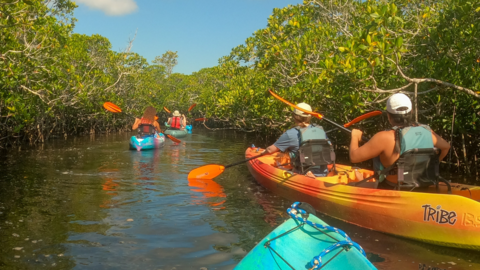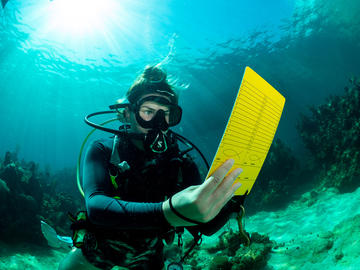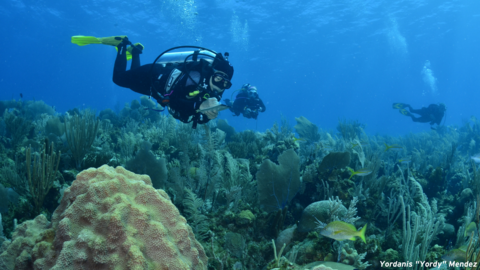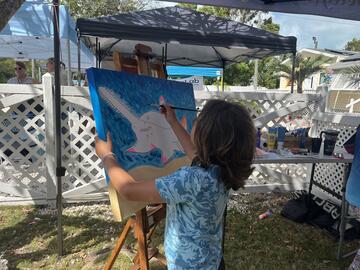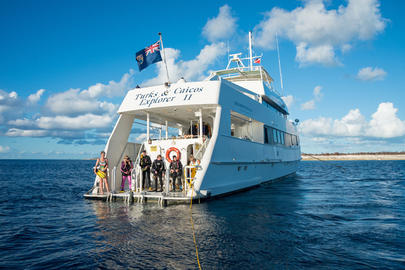Education is a core part of REEF's marine conservation mission. From elementary school classes to adult travel groups, we offer programs for all ages and backgrounds through the REEF Ocean Explorers Education Program. Participants can join in both online and in person, and learn about topics like fish identification, citizen science, marine life behavior, invasive species, endangered species, sustainable fisheries, and Florida Keys ecology.
Current search
Search found 426 items
- INVASIVE
2023 marks the 30th anniversary of the REEF Volunteer Fish Survey Project. Since its launch in 1993, this citizen science program has generated one of the largest marine life databases in the world through marine life sightings surveys conducted by volunteer divers and snorkelers. A key aspect of the project's success and impact is that REEF data are available to everyone.
On June 22, SCUBA divers, marine conservation enthusiasts, and foodies gathered at Piccolo Ristorante in Fort Lauderdale, Florida, to attend the second annual Lionfish Tasting Dinner. During the event, patrons learned about effects of the lionfish invasion while sampling the tasty invader’s light, white meat. At the end of the evening, DiveBar, one of the night’s sponsors, presented REEF with a check for $1,500 to support our Invasive Lionfish Program.
REEF is excited to introduce three new members of our staff team – Alecia Adamson, Sasha Medlen, and Janna Nichols. Their expertise and passion will help REEF continue our long-standing marine conservation programs and community outreach. They join REEF's other program staff, Lad Akins (Director of Operations) and Christy Pattengill-Semmens (Director of Science), our administrative staff, Jane Bixby (Office Manager) and Janet Bartnicki (Accounts Manager), and our volunteer Fish & Friends coordinator Nancy Perez.
Spring has been a rewarding and productive season for the REEF Campus-based Ocean Explorers Education team! From traveling to the Florida panhandle to lend a hand with measuring fish at the world's largest lionfish derby, to attending a conservation-based music festival on the beach in south Florida, we have been spreading the word about REEF’s programs far and wide. Here are some recent education and outreach highlights.
Expand your knowledge of fish id at this lovely seaside resort in the heart of beautiful St. Lucia. The entire region is a protected marine area and excellent, easily accessible beach diving is available directly in front of the resort. When not diving or snorkeling, guests can enjoy many other activities including sea kayaking, jungle biking, yoga and sailing. Anse Chastanet is an environmentally-conscious, luxury resort with plenty of amenities and delicious food, making it a great destination for REEF surveyors of all levels.
BARE Makes In-Kind Donation to REEF
Coral Restoration Foundation (CRF) and Reef Environmental Education Foundation (REEF), are working together to raise awareness about coral reef conservation in the Florida Keys. For the first time ever, the marine conservation groups will host a special event, “Coral In and Lionfish Out,” to engage the public and raise funds for coral restoration and lionfish removal efforts in the Florida Keys.
This special Lionfish Research Trip is part of REEF’s ongoing effort to monitor the establishment and consequences of invasive lionfish on native fish populations and reef ecosystems. The trip includes a unique research itinerary aboard the Turks and Caicos Explorer II to visit remote areas of the Bahamas including Mayaguana, Plana Cays, Crooked Island, Salina Point, and Castle Island. Trip participants will also have the chance to be trained in lionfish collection, handling and dissection of specimens to document prey.

